When preparing for a nursing interview, most candidates spend hours perfecting their resumes. They rehearse answers and research the hospital or clinic and their salary structures. But there’s one detail that often gets overlooked is your outfit. Before you even say a word, what you wear sets the tone for how you’ll be perceived.
So, what to wear to a nursing interview? The simple answer is professional business attire, but not scrubs. Even though nursing is a clinical role, interviews are about first impressions, and your outfit should reflect professionalism, respect for the employer, and confidence in yourself.
What to Wear to a Nursing Interview?
1. Appropriate Attire to Wear to a Nursing Interview
When walking into a nursing interview, your outfit will often be noticed before your words. It communicates professionalism, respect, and attention to detail—all qualities employers look for in healthcare professionals. That’s why choosing appropriate attire for a nurse interview is essential.
The safest rule? Dress in business professional attire unless the employer tells you otherwise. Even if the hospital environment feels casual, it’s always better to be slightly overdressed than underdressed.
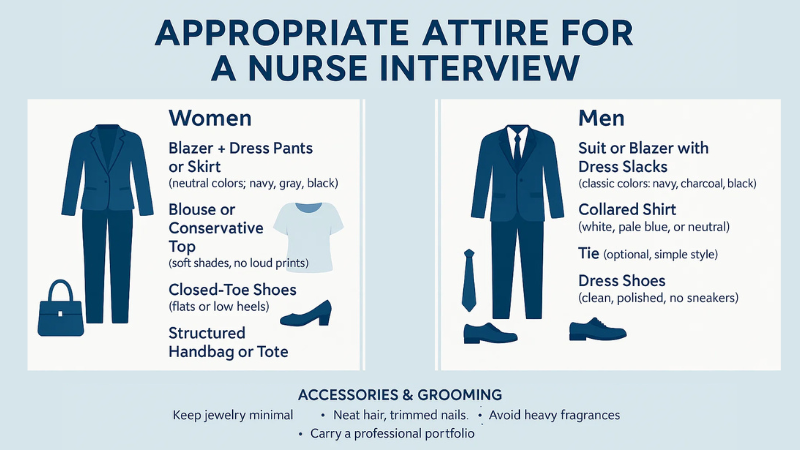
For Women
- Blazer + Dress Pants or Skirt:
A fitted blazer paired with tailored pants or a pencil skirt gives a sharp, professional look. Neutral colors like navy, gray, or black are ideal. If you choose a skirt, make sure it’s knee-length or longer.
- Blouse or Conservative Top:
Opt for a button-up blouse or modest top in soft, solid shades. Avoid plunging necklines, loud prints, or overly trendy styles.
- Closed-Toe Shoes:
Stick with flats or low-to-mid heels. Comfort matters, but the shoes should still look professional. Open-toe sandals or casual footwear can appear too relaxed.
- Bag Choice:
A structured handbag or tote looks more professional than a backpack or oversized purse.
For Men
- Suit or Blazer with Dress Slacks:
A well-fitted suit is ideal, but a blazer paired with pressed slacks is equally professional. Choose classic colors like navy, charcoal, or black.
- Collared Shirt:
A crisp, button-down shirt in white, pale blue, or another neutral shade works best. Make sure it’s ironed—wrinkles can make you look unprepared.
- Tie (Optional):
For hospitals with a more formal culture, a tie adds polish. For community clinics or casual facilities, it may not be required. If worn, choose a simple pattern or solid color.
- Dress Shoes:
Clean, polished shoes are non-negotiable. Avoid sneakers, sandals, or anything too casual.
Accessories & Grooming Tips
- Keep It Simple:
Jewelry should be minimal—a wristwatch, small stud earrings, or a delicate necklace. Avoid flashy or distracting accessories.
- Grooming:
Neat hair, well-trimmed nails, and subtle makeup (if used) show attention to detail. Avoid heavy fragrances, as many hospitals enforce scent-free policies.
- Portfolio & Extras:
Carry a professional-looking folder or portfolio for your resume and references. This small touch reinforces professionalism.
If you don’t have a resume, don’t worry. Just download a professional nursing resume template, fill in your details and you are good to go.
Colors and Fabrics Matter
- Stick with Neutrals:
Navy, gray, black, and white are safe, universally professional choices.
- Accent with Soft Colors:
Light blue, beige, or soft pastels can add warmth without being distracting.
- Avoid Bright or Distracting Prints:
Hospitals value professionalism—save bold patterns for after you land the job.
- Fabric Choice:
Choose breathable, wrinkle-resistant fabrics. Looking sharp and feeling comfortable will boost your confidence during the interview.
Why This Matters in Nursing Interviews
Even though nurses don’t wear suits to work, your interview is about first impressions. Business attire shows:
- You respect the opportunity and take the role seriously.
- You understand workplace professionalism.
- You can adapt to formal situations—important when interacting with doctors, administrators, and patients’ families.
Choosing appropriate attire for a nurse interview isn’t just about looking good—it’s about projecting confidence, professionalism, and readiness to join a respected healthcare team.
2. Understand Nursing Interview Dress Code
When preparing for a nursing interview, one of the most common questions candidates have is: “Do I wear scrubs or business clothes?” The answer is simple— those perfect-looking scrubs are for your shifts, not your interviews.
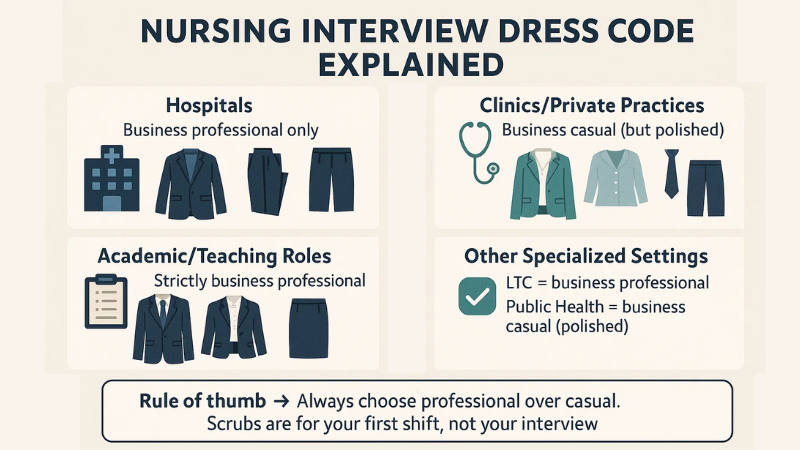
Even though nursing is a clinical job, interviews call for professional attire that demonstrates respect, confidence, and seriousness about the role. That said, expectations can vary depending on the type of healthcare setting:
Hospitals
- Dress Code Expectation:
Business professional attire is the gold standard.
- What to Wear:
A suit, blazer with dress pants, or skirt for women; a suit or blazer with slacks and a collared shirt for men.
- Why:
Hospitals are large, formal institutions where professionalism is highly valued. Dressing up shows that you understand the seriousness of patient care and teamwork.
Clinics or Private Practices
- Dress Code Expectation:
Business casual may be acceptable, but always lean and polished.
- What to Wear:
A blazer over a blouse or collared shirt, paired with dress pants or a skirt. Men can wear slacks and a button-up shirt, with or without a tie.
- Why:
Smaller clinics often have a more relaxed environment, but interview attire should still signal professionalism. A “business casual” look ensures you appear approachable yet competent.
Academic or Teaching Roles
- Dress Code Expectation:
Business professional is non-negotiable.
- What to Wear:
A full suit or formal blazer combination.
- Why:
Teaching, training, or leadership roles require authority and presence. A sharp, professional outfit signals leadership, reliability, and respect for both colleagues and students.
Other Specialized Settings
- Long-Term Care Facilities:
Lean business professional, administrators will expect you to present yourself as a role model for staff.
- Public Health Interviews:
Business casual may be acceptable, but polished professionalism is still essential since you’ll often represent the organization in the community.
In short, the nursing interview dress code explained = always lean towards professional over casual. Scrubs, sneakers, or overly relaxed outfits should be reserved for your first official shift—not your interview.
3. Wearing Scrubs in a Nursing Interview: Good Idea or a No?
One of the biggest points of confusion for nursing candidates is deciding whether scrubs are appropriate interview attire. After all, scrubs are the daily uniform of nurses, so doesn’t it make sense to wear them?
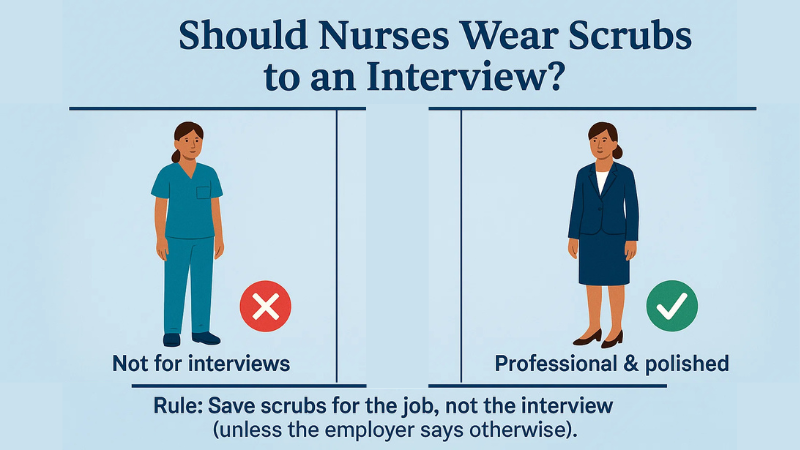
The answer is almost always no. Unless the employer specifically instructs you otherwise, scrubs should not be worn to an interview. Here’s why:
- Professional Image:
Scrubs are associated with being “on the job,” not interviewing for one. Employers expect you to present yourself in polished, business-appropriate clothing that reflects your professionalism.
- First Impressions:
Interviews are your chance to stand out. Walking in with scrubs can give the impression that you didn’t take the process seriously.
- Respect for the Process:
Business attire signals to the hiring manager that you value their time and the opportunity being offered.
When Scrubs May Be Acceptable (Rare Exceptions)
- Working Interviews:
Some facilities may arrange a shadowing or “working” interview where you’ll spend time in the unit. In these cases, you may be instructed to bring or wear scrubs.
- Skills Assessments:
If your interview involves direct patient care or a hands-on demonstration, scrubs could be appropriate. But only if the employer specifies.
- Pre-Arranged Requests:
Always follow the exact dress code instructions provided by HR or the hiring manager.
Bottom line: Unless explicitly told otherwise, nurses should never wear scrubs to an interview. Save your scrubs for your first day on the floor. Your interview is about presenting the most professional version of yourself.
4. Professional Outfit Tips for Healthcare Interviews
Dressing for a healthcare interview is about striking the right balance between professionalism, comfort, and confidence. The goal is to ensure your outfit supports your presence—not distracts from your skills and experience. Here are some detailed professional outfit tips for healthcare interviews:
Choose Neutral, Professional Colors
Stick with classic shades like navy, black, gray, or white. These colors are universally professional, easy to coordinate, and help you project confidence without pulling focus. If you want to add personality, do so with a subtle pop of color like a pastel blouse under a blazer or a muted tie.
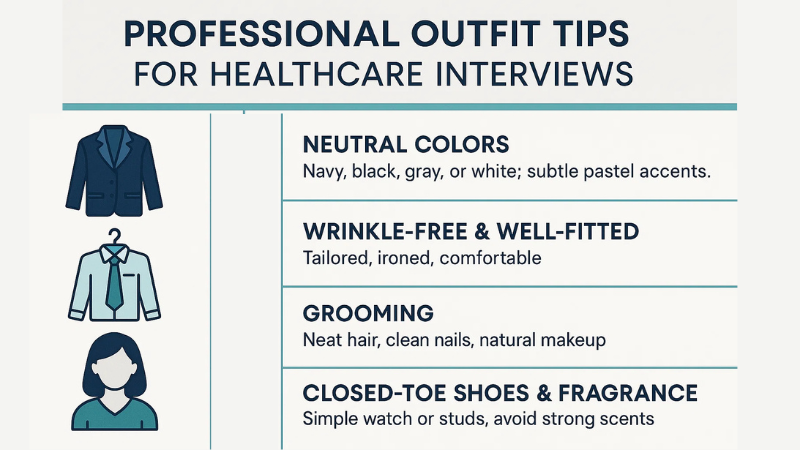
Keep Clothing Wrinkle-Free and Well-Fitted
An ironed, tailored outfit shows attention to detail—a skill highly valued in nursing and healthcare. Avoid anything too tight or baggy; instead, aim for clothing that fits comfortably and allows you to sit, stand, and move naturally during the interview.
Pay Attention to Grooming
Personal presentation matters just as much as clothing:
- Hair: Keep it neat and away from your face.
- Nails: Clean and trimmed (avoid overly bright or distracting polish).
- Makeup: If you wear it, keep it natural and professional.
This subtle polish demonstrates that you take pride in your appearance, which translates to how you might represent the organization.
Opt for Closed-Toe Shoes
Closed-toe footwear is non-negotiable in interviews. For women, low to medium heels or flats work best; for men, polished dress shoes are ideal. Avoid sneakers, sandals, or overly trendy footwear. Shoes should complement your outfit—not steal attention.
Keep Jewelry and Fragrance Minimal
Less is more when it comes to accessories. A simple watch, small stud earrings, or a delicate necklace is enough. Avoid heavy colognes or perfumes, as strong scents can be distracting or even trigger sensitivities in healthcare settings.
Following these professional outfit tips for healthcare interviews ensures your appearance communicates competence, respect, and confidence—helping you stand out for all the right reasons.
5. Colors to Avoid in a Nursing Interview
When it comes to interview outfits, color is psychological. The shades you wear can shape how employers perceive your personality, professionalism, and even your confidence level. While you don’t need to overthink every shade, there are a few colors best left out of your nursing interview wardrobe.
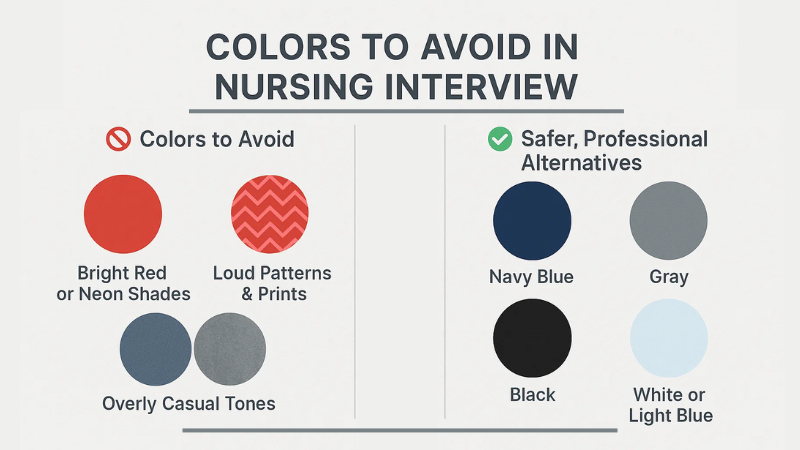
Colors to Avoid
- Bright red or neon shades –
While red can symbolize power, it can also appear aggressive or overwhelming in a healthcare interview. Neon colors (lime green, hot pink, etc.) are distracting and shift the focus away from your qualifications.
- Loud patterns and prints –
Polka dots, busy florals, or bold geometric patterns may be fun for casual wear but can look unprofessional or distracting in a formal setting.
- Overly casual tones (jeans/t-shirt colors) –
Faded denim blues, distressed grays, or worn-out shades suggest casualness, which clashes with the polished image you want to project.
Safer, Professional Alternatives
Instead, stick with classic colors that send the right message:
- Navy blue – Confidence, stability, and trustworthiness.
- Gray – Professional, neutral, and versatile.
- Black – Timeless authority and sophistication.
- White or light blue – Clean, approachable, and caring—qualities that align with nursing values.
Choosing the right colors doesn’t just make you look polished—it reinforces your professionalism and readiness for the role. Think of your outfit as part of your first impression toolkit, working silently alongside your resume and interview answers.
6. Accessories and Final Touches
The little details matter more than you might think. Accessories and grooming choices can either enhance your professional look or distract from it. The goal is to appear polished, confident, and ready for a healthcare environment. Here’s how to get it right:
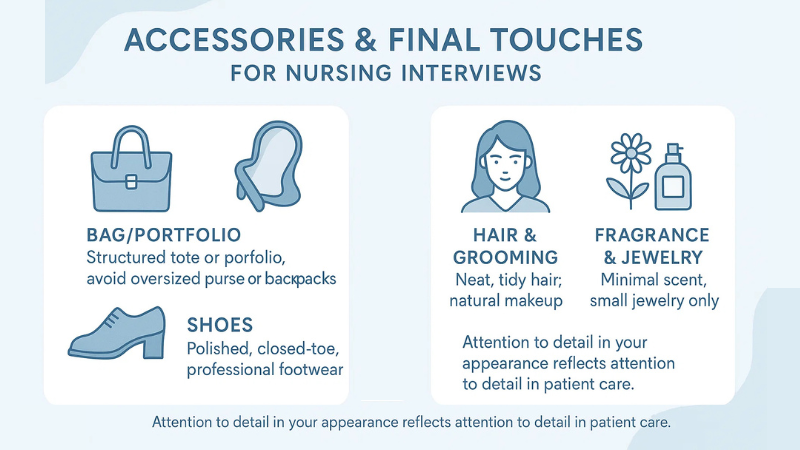
Bag or Portfolio
- Skip oversized purses, flashy handbags, or casual backpacks. They can look unprofessional or distracting.
- Instead, bring a sleek leather portfolio or a simple, structured tote. This allows you to neatly carry copies of your resume, references, a notepad, and a pen. It signals organization and attention to detail—qualities every employer values in a nurse.
Hair and Grooming
- Keep your hairstyle neat, tidy, and away from your face. If you have long hair, consider tying it back in a ponytail, bun, or braid.
- For shorter styles, make sure hair looks brushed and intentional. Stray hairs or messy styles can unintentionally look careless.
- Makeup should be light and natural. Think of it as enhancing rather than distracting.
Fragrance and Jewelry
- When it comes to fragrance, less is more. Strong scents may trigger sensitivities, especially in a healthcare setting. A light touch—or none at all—is safest.
- Jewelry should be subtle. Small stud earrings, a delicate necklace, or a classic wristwatch work well. Avoid large hoops, dangling earrings, or anything that makes noise.
Shoes and Polish
- Shoes should always be closed-toe, polished, and professional—flats, modest heels, or classic dress shoes.
- Make sure they’re clean and in good condition. Scuffed or worn-out shoes can quietly undermine your otherwise sharp look.
By paying attention to these final touches, you’re showing your interviewer that you value professionalism not just in your work, but in how you present yourself. After all, if you can manage the details in your appearance, it suggests you’ll manage details in patient care too.
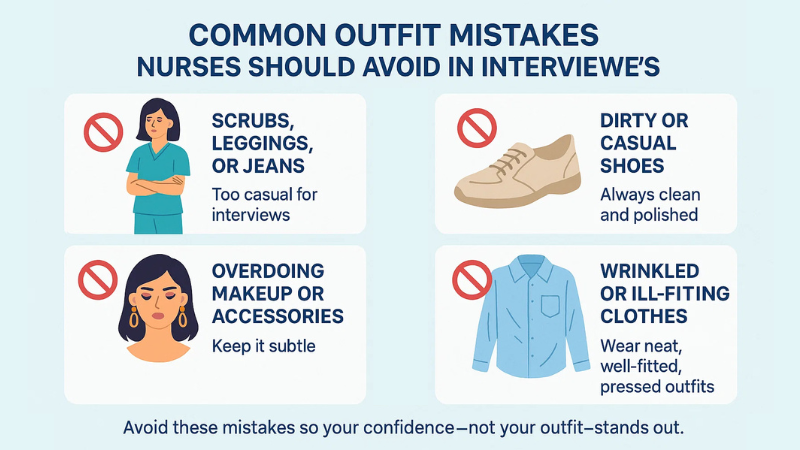
7. Common Mistakes to Avoid
Even the most skilled and experienced candidates can lose points in an interview if their attire sends the wrong message. Your outfit should build trust and confidence but not raise red flags. Here are the most common mistakes nurses make when dressing for interviews, and why you’ll want to avoid them:
Wearing Scrubs, Leggings, or Jeans
Unless the facility specifically asks you to wear scrubs for a working interview, they’re a no-go. Scrubs, jeans, or leggings make you look like you skipped the effort to prepare. Interviews are about professionalism, not convenience.
Ignoring Your Shoes
Dirty, worn-out, or overly casual shoes can ruin an otherwise polished look. Remember, interviewers notice the details. Shoes that are clean, polished, and professional show that you care about presentation and take pride in how you carry yourself.
Overdoing Makeup, Perfume, or Accessories
Heavy makeup, strong perfume, or flashy jewelry can be distracting—and in healthcare, sensitivity to scents is especially important. Aim for subtlety. Neutral makeup, light (or no) fragrance, and minimal jewelry help you look refined and focused.
Wrinkled, Ill-Fitting, or Casual Clothing
Nothing says “I’m not ready” like a wrinkled shirt, pants that don’t fit well, or casual t-shirts. Your clothing doesn’t have to be expensive, but it should be clean, pressed, and tailored enough to look sharp. Too-tight or overly casual outfits can send the wrong impression about professionalism.
Remember: The goal is to look polished, approachable, and professional. By avoiding these common mistakes, you’ll let your skills and confidence shine without your outfit getting in the way.
Conclusion
At the end of the day, choosing what to wear to a nursing interview goes far beyond fashion. It’s about showing respect—for the role you’re stepping into, for the employer who may hire you, and for the patients you’ll eventually care for.
Interviews are your chance to demonstrate professionalism, confidence, and readiness before you ever answer a single question. A polished, well-thought-out outfit says, “I take this opportunity seriously, and I’m ready to represent your organization with pride.”
So remember:
- Stick to professional attire over casual or clinical wear.
- Pay attention to details like grooming, shoes, and accessories.
- Avoid common mistakes that could distract from your qualifications.
When you dress the part, you not only look professional—you feel more confident walking into the room. And that confidence can make all the difference in landing the nursing job you’ve worked so hard for.
FAQs: What to Wear to a Nursing Interview
What should a nurse wear to an interview at a hospital?
A professional outfit, such as a suit or blazer with dress pants or a skirt. Avoid scrubs unless requested.
Is it okay to wear scrubs to a nursing interview?
Not unless specifically instructed. Scrubs are for work, not interviews.
Do colors matter in a nursing interview outfit?
Yes. Neutral, conservative colors like navy, gray, or black are best. Avoid flashy or neon tones.
Can nurses wear flats or sneakers to interviews?
Flats are fine if they look professional. Sneakers are not recommended unless extremely polished and business-like.
What is considered too casual for a nurse interview?
Jeans, t-shirts, scrubs, leggings, sandals, or flashy attire are too casual and should be avoided.
By dressing the part, you’ll project confidence, professionalism, and readiness for the job.

Leave a Reply